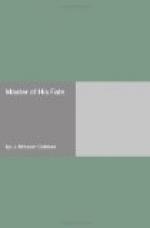Before the doctor recovered himself the man was well past, and disappearing in the throng. He hurried after, determined to overtake him, and to make a full and satisfying perusal of his face and figure. He found that difficult, however, because of the man’s singular style of progression. To maintain an even pace for himself, moreover, Lefevre had to walk very much in the roadway, the dangers of which, from passing cabs and omnibuses, forbade his fixing his attention on the man alone. Yet he was more and more piqued to look him in the face; for the longer he followed him the more he was struck with the oddity of his conduct. He had already noted how he hurried over the empty spaces of pavement and lingered sinuously in the thronged parts; he now remarked further that those who came into immediate contact with him (and they were mostly young people who were to be met with at that season of the night) glanced sharply at him, as if they had experienced some suspicious sensation, and seemed inclined to remonstrate, till they looked in his face.
Lefevre could not arrive at a clear front view till, by Charing Cross Station, the man turned on the kerb to look after a handsome youth who crossed before him, and passed over the road. Then the doctor saw the face in the light of a street-lamp, and the sight sent the blood in a gush from his heart. It was a dark hairless face, terribly blanched and emaciated, as if by years of darkness and prison, with the impress of age and death, but yet with a wistful light in the eyes, and a firm sensuousness about the mouth that betrayed a considerable interest in life. He turned his eyes away an instant, to bring memory and association to bear. When he looked again the man was moving away. At once recognition rushed upon him like a wave of light. The terribly worn, ghastly features resolved themselves into a kind of death-mask of Julius! The wave recoiled and smote him again. Who could the man be, therefore, who was so like Julius, and yet was not Julius?—who could he be but Julius’s father,—that Hernando Courtney whom Dr Rippon believed he had seen the evening before?
Here was a coil to unravel! Julius’s father—the Spanish marquis that was—supposed to be dead, but yet wandering in singular fashion about the London streets, clearly not desiring, much less courting, opportunities of being recognised; Julius not caring to speak of his father, apparently ignoring his continued existence, and yet apparently knowing enough of his movements to avoid him when he came to London by suddenly removing “into the country” without leaving his address. What was the meaning of so much mystery? Crime? debt? political intrigue? or, what?




